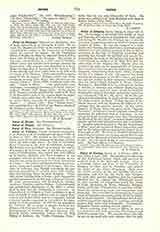

Peter of Poitiers, French scholastic theologian, b. at Poitiers or in its neighborhood about 1130; d. in Paris in 1215. He studied at the University of Paris, where he became professor of theology and lectured for thirty-eight years. In 1169 he succeeded Peter Comestor in the chair of scholastic theology. His lectures were so brilliant as to inspire the enmity of Gauthier de St-Victor, one of the bitterest opponents of Scholasticism, who ranked him with Gilbert de la Porree, Abelard, and Peter Lombard in the pamphlet wherein he tries to throw ridicule on the four doctors, under the name of the “Four Labyrinths of France“. In 1179 he published five books of sentences which are a synopsis of his lectures. His doctrine is orthodox, but, though containing no condemned proposition, it exhibits more vain subtilty than real theology based on Holy Scripture. Those who accuse Scholasticism of being a mere logomachy can find arguments in the writings of Peter of Poitiers. He wrote commentaries, still unedited, on Exodus, Leviticus, Numbers, and the Psalms. A chronological and genealogical abridgment of the Bible is attributed to him, but the authorship is uncertain. As Chancellor of the Church of Paris he displayed great zeal on behalf of poor students, and to supply their want of textbooks, which were very expensive, he had a kind of synopsis engraved on the walls of the classrooms for their assistance. In 1101 he was appointed by Celestine III to settle a dispute between the Abbeys of St-Eloi and St-Victor. He was a constant correspondent of Celestine III and Innocent III. Certain writers erroneously believe that he died Bishop of Ewbrun; the “Gallia Christiana Nova” shows that he was only Chancellor of Paris. His works were published by Dom Mathoud with those of Robert Pullus (Paris, 1855).
J. LATASTE

